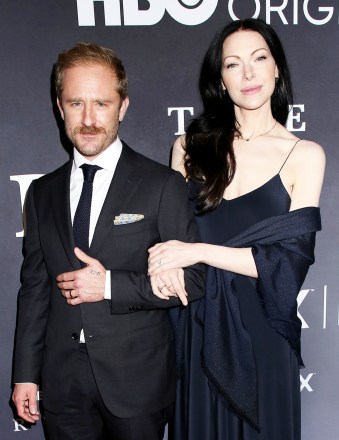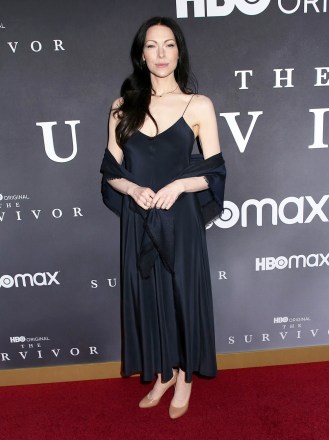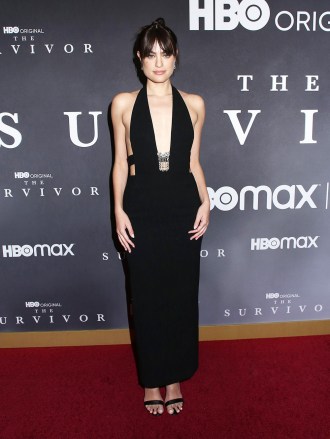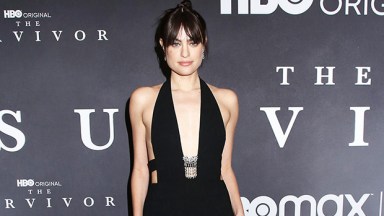
The Survivor is HBO’s incredible new film about the life of Harry Haft, a Holocaust survivor and professional boxer. The movie, directed by Barry Levinson, chronicles Harry’s horrific time at Auschwitz and his determination to reunite with the woman he loves. Dar Zuzovsky plays Leah, the woman who is never too far from Harry’s mind. After years and years of being apart, Harry and Leah have an emotional and transformative reunion at the end of Leah’s life.
HollywoodLife spoke EXCLUSIVELY with the Israeli actress about being truly “connected” to co-star Ben Foster while filming the pivotal reunion scene. Dar believes that Harry and Leah’s reunion was an act of “higher intervention” that liberated them both. She also opened up about what The Survivor means to her on a personal level since her grandparents are Holocaust survivors. Read our Q&A below:
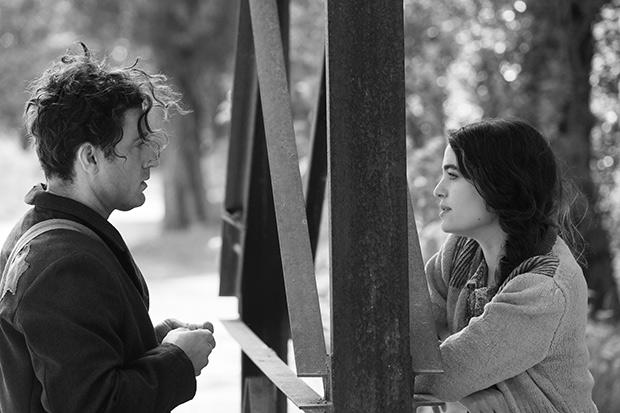
I did know about Harry Haft’s story before watching the film. Were you familiar with his story prior to this role?
Dar Zuzovsky: No, actually, I wasn’t. When I got the script I immediately wanted to read the book. Harry’s son, Alan Scott Haft, wrote the book about his father. That was when I got familiar with it, but I didn’t know anything before. The script is a little bit different than the book. It has more drama. The book really tells a story. I don’t know if you’ve got to read it, but it’s very slow and takes time until you understand. Every period of his life is in a different chapter. And here, what I love about it, you jump between timelines. You start in Poland, and then you jump to the 40s in New York, and then you go to the 60s in Georgia. You never know where you are until around the end of the film. You get the whole picture and you understand what you just saw. It was a whole life journey.
Was Leah a real person?
Dar Zuzovsky: Yes, she was. It’s not the same as in the film in the book. They were boyfriend and girlfriend in Poland in the city that they grew up in. They knew each other because they were in the same neighborhood, but in the movie, they meet each other at one point when they’re when Harry’s trying to smuggle some goods into a house. I think that part of the story is not in the movie anymore, but that was in the script. So they actually have their first meeting when the war already started. But in real-life, they met before and he’s been trying to find her.
The film builds up to this beautiful reunion in the end. Leah and Harry finally do see each other again as Leah is dying. What was filming that emotional scene alongside Ben Foster like for you?
Dar Zuzovsky: First of all, thank you so much. It really warms my heart and you make me blush. It was one of those moments I think that you can never prepare for. You don’t know what will happen on the date. You’re doing your job. You study the character. You do your research. You learn your lines, and you come there and really hope that the magic will happen. Sometimes it happens and sometimes it doesn’t. Luckily, I got to work with the most generous actor on the planet really. He’s so alive in every take. He’s such a great partner, and he gives so much that I felt like I can really like put all my thoughts and all of my worries and everything aside and be in the moment. The magic just happened. We were truly connected, and our characters were truly connected. It felt magical on set. Everybody cried. It was an overwhelming moment, and we knew that it has to work because that’s the emotional key to the whole journey.
Do you think that they both got that closure that they needed after searching for so long for it?
Dar Zuzovsky: Yes, because I think it was Nietzsche who said, “He who has a why to live for can bear almost any how.” In this case, and in most cases, love is the strongest force on earth. By holding on to that and having that hope that you will find that person you actually find that, while the journey looks like it’s a search for love, what really happened is that he found himself and the love was just the engine, the electricity that he needed to go on, to keep on living. You have to get out of yourself to really understand yourself. It’s not about her. It’s not about the beloved. It’s about having that fire glisten in your heart. I think that that’s the only way to survive such horrific things. I don’t know if he would be able to survive something so terrible without having a cause, without having a purpose.
Has this film made you think more about just the sheer power of love and its strength to carry people through dark times?
Dar Zuzovsky: This particular story resonates with me on a personal level. It really hits so close to home. My grandparents are Holocaust survivors. My grandfather was actually in Auschwitz at the same concentration camp that Harry was. I’m a third generation of Holocaust survivors, so I got to witness their life after the war. I was fortunate enough to not experience the Holocaust itself, but I did witness the aftermath. I saw the consequences. I saw how my grandparents functioned. We weren’t able to throw food. It was like if we would try to throw something my grandfather would just take it and eat everybody’s leftovers. It was something that I was used to. I didn’t think it was something weird. This is what life is about. You don’t throw food, and you don’t play the piano between two to four. I feel like I’m so lucky to have witnessed two people, two survivors that found love after the war, who came to Israel and started a family, created a beautiful life, and made children. I’m a part of this heritage. This is my life. So if you’re asking me if I believe in love, obviously I believe that that’s the only thing that is worth fighting for. That’s the only thing that is real. I see it every day. They’re still together. They’re the cutest couple in the world. They inspire me.
You get to work alongside the incredible Barry Levinson. What was it like being under his direction and helping to create this incredible story?
Dar Zuzovsky: I was shocked that I was going to work with him because he is a legend. I’m coming from a very small town in Israel. It was a dream. When I first met him, he was the sweetest human being really, the most down to Earth. The whole meeting we didn’t even speak about the script. We spoke about quantum physics and like everything else you can imagine and about music and art. I was so lucky to see him work and see him do his magic. I can only imagine that because he’s so sure of himself and his craft and what he has to give he’s just very free. He loves to search with the actors. There is a lot of time to try different things, make mistakes, and do things that are not necessarily written in the script. For an actor, it’s a gift because you get to relive the moment and be there and have and feel confidence and faith that you have someone that’s there with you and you can just play and try. It was a wonderful experience. I’m really lucky to have that as my first director here in Hollywood.
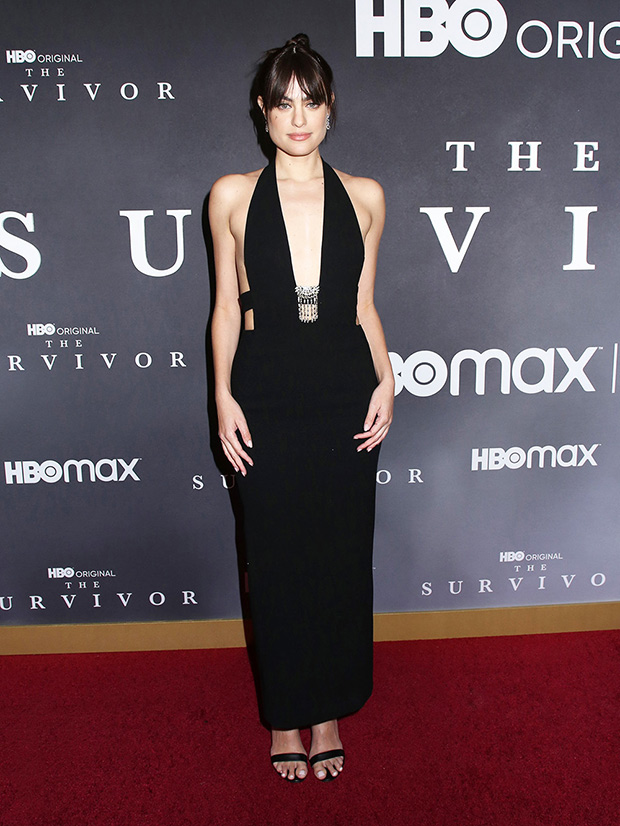
After watching the Leah and Harry reunion scene, I kept thinking about how our lives are shaped by destiny and fate. She saw that newspaper clipping of Harry right as she was getting married.
Dar Zuzovsky: It’s a very spiritual and also heart-wrenching moment that she didn’t contact him because she got married the same day. She knew he was alive, and that was enough for her, that little piece of paper because that’s everything she wanted to know. I think that the fact that he came and saw her in her last days, right before she passed, was some kind of higher intervention. They wouldn’t go out of this world without having that little moment of acknowledging each other, looking in each other’s eyes, and seeing that they’ve been through all this horror and trauma and separation for so long and having someone who truly knows you and knows what you’ve been through and knows who you were before. I don’t think there is anything more liberating than that.
